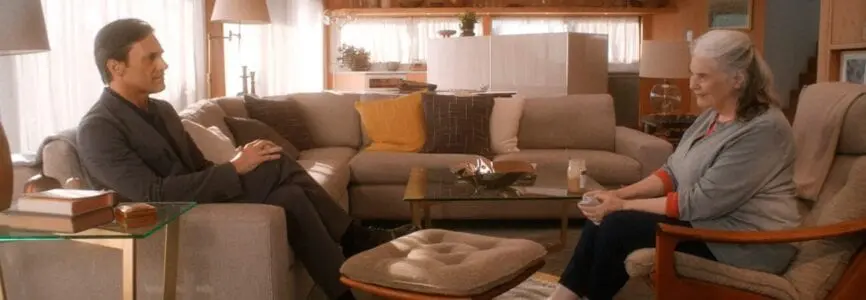Bioethics Forum Essay
Should We Get Ready for Prime Time?
For the first few years after my husband Howard died, I talked to him often. These were not ghostly, paranormal encounters; I was just thinking out loud about my life without him. Ten years later, these occasions happen less frequently, usually connected with an anniversary or a family event. In my imagination, he looks like the man he was in the years before the accident that left him totally disabled.
Instead of an imaginary conversation, what if I could have a facsimile that looks like Howard, talks like him, and even knows a lot about things I may have forgotten? That is the premise of the new film Marjorie Prime, written and directed by Michael Almereyda. It blends science fiction with ethical questions about what is lost and what remains when memory fades, and what it means to be human. The more we learn about how the brain works and how artificial intelligence could affect our lives, the more important these questions become.
In the film primes are holograms—visual projections of images that appear to be three-dimensional. A person can choose a prime’s age and thus its appearance. Primes are not caregiving robots; they can’t make lunch or turn on a dishwasher. They can’t touch or be touched. They are programmed to tell stories, remind the person about long-ago events, and generally be reassuring and comforting presences.
The first prime seen in the film, set in a not-too-far-off time, is Marjorie’s late husband Walter. Marjorie (an 86-year-old woman played by Lois Smith, who is the same age) is seated in a chair. Across from her is a handsome young man (Jon Hamm)—Walter at a much younger age than he was when he died. The only indication that he is a hologram occurs when Marjorie briefly walks right through his foot. This is not a high-action, special-effects movie. In fact, very little happens on screen, although life-changing events are recalled or take place elsewhere.
The other two main characters are Tess (Geena Davis), Marjorie and Walter’s 50-something daughter, and her husband Jon (Tim Robbins). Marjorie lives with them in a beautiful home with a swimming pool by the ocean. Water is almost a character in the film, and the ocean permeates the evocative sound track.
Tess finds it upsetting that her mother talks to her father who isn’t her father or even the father she remembers. There is more to the story, of course; this being a drama about families, there are losses so devastating that even their memories are buried and their impact unacknowledged.
Before Marjorie Prime was a film, it was a play stimulated in part by a book. The play was written by Jordan Harrison and appeared off-Broadway in 2012. Harrison says that there were two major influences: one was the book The Most Human Human: What Artificial Intelligence Teaches Us About Being Human by Brian Christian (New York: Anchor Books, 2011). In 2009 Christian won the award for the Most Human Human in the annual Turing test. In this exercise, created by the British mathematician Alan Turing, one of the founders of computer science, computer programs compete with real people to determine after five-minute rounds of questioning which in each category are the most “human.”
The second influence was Harrison’s grandmother’s decline from dementia, which his parents documented in a caretaking journal. He says, “What struck me about it was how much of their daily task was to remind her who she was—who she loved, her favorite memories, and what she was good at.” In the play, and in the film, these become the primes’s tasks.
The film (and the play and especially the book) dazzle the viewer/reader with the possibilities of technology, but the authors ultimately lead us to the conclusion that no matter how sophisticated AI becomes, there will always be some core of humanity that it cannot replace. The primes have learned the nuances of human communication; Walter Prime acknowledges a new fact by saying, “Thank you. I’ll remember that.” But when confronted by a situation for which they have not been prepared, they look puzzled. In the play, the actor is guided by the stage direction “faintly generic” before the words. Primes’s intelligence, artfully demonstrated by the actors, is visibly “artificial.”
Christian, a poet as well as a computer scientist and philosopher, believes that because humans have the ability to adapt, the Turing test will eventually become a test of a different sort – “the one where we humans, knocked to the proverbial canvas, must pull ourselves up; the one where we learn how to be better friends, artists, teachers, parents, lovers,” he writes in his book, “the one where we come back. More human than ever.”
For a computer, memory loss can be a disaster. For a person, memory loss is certainly difficult but it does not mean the loss of the person’s humanity. Some essence–spirit, soul, anima, or whatever name one gives it–exists beyond memory. When my beloved grandmother, with whom I spent every day of my childhood, was in a nursing home, I took my two young daughters to meet her. She looked at me and at them, then held out her arms and said, in Yiddish, “I don’t know who you are, but I know you belong to me.” No prime could do that.
Carol Levine directs the Families and Health Care Project at the United Hospital Fund. She is a Fellow of The Hastings Center.














wonderful and very touching….
This is so wonderful, both as a movie review (I hadn’t heard of it and now I want to watch it) and as a story about Carol’s grandmother. It moved me to tears.
Thanks so much Bonnie. My grandmother deserves her own essay. Carol